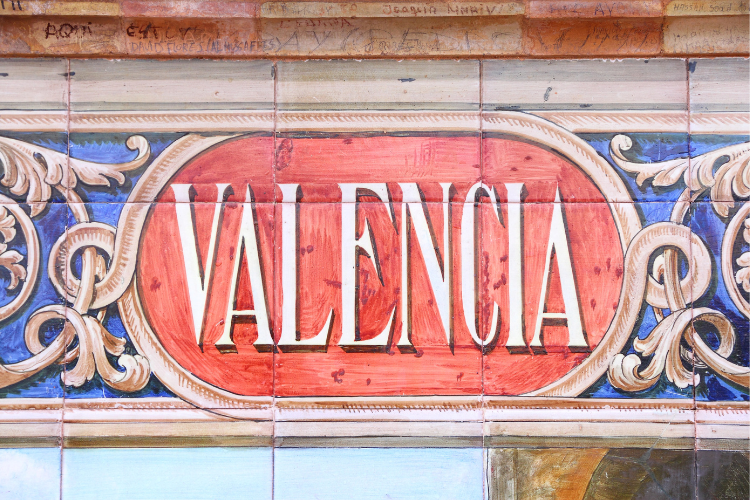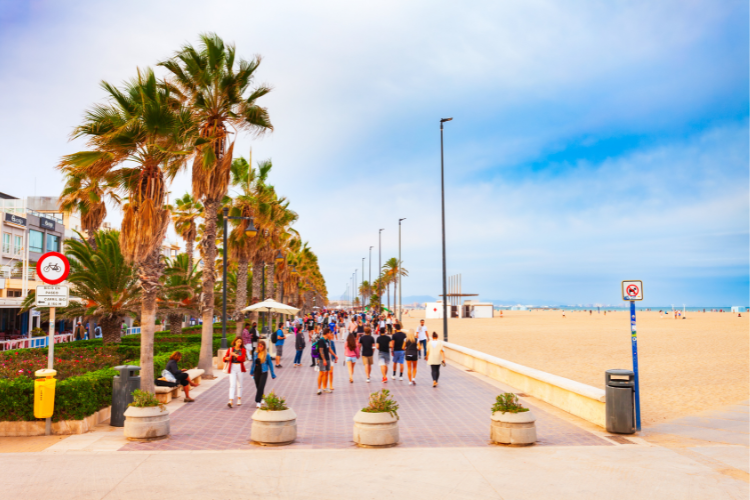Last Updated on March 3, 2025 by Maryam Siddiqui
When people dream about moving to Spain, cities like Barcelona and Madrid often take the spotlight. But over the last decade, Valencia has quietly emerged as one of the most desirable places for expats seeking sunshine, culture, and a high quality of life. With its laid-back Mediterranean vibe and affordable cost of living, Valencia offers a lifestyle that’s hard to match. However, like any city, there are pros and cons of living in Valencia.
So, what’s it really like living in Valencia? Is it the right move for you? Let’s dive into the pros and cons, the expat community, and why so many people are choosing to call this beautiful city home.
Happy reading!

What Is It Like Living In Valencia?
With around 800,000 residents in the city itself and 1.5 million in the greater metro area, it has all the amenities of a big city without the overwhelming size. You can get from the city center to the beach in about 20 minutes, and the airport is just a 15-minute metro ride away.
Valencia is also famous for its 300+ days of sunshine per year. Winters are mild, and summers are long, which supports a year-round outdoor lifestyle. Expect long lunches, late dinners, and a general fondness for enjoying life beyond work. If you’ve researched well, you’ll know that this is the heart of Spanish culture, after all.
The city is particularly popular among the digital nomad community and expats who aren’t looking to live in bigger cities like Madrid and Barcelona. That’s because life in Valencia feels like a continuous invitation to slow down and enjoy the moment.
Who Lives In Valencia?
Valencia is home to a diverse population. Traditionally, the city has been a mix of locals from the Valencian region and people from other parts of Spain. However, the expat community has grown rapidly over the past few years.
According to the National Institute of Statistics (INE), more than 150,000 foreign residents live in the Valencia province. Since 2020, the number of remote workers and retirees has increased as they seek more affordable, sunnier alternatives to bigger cities.
Some of the largest expat groups in Valencia belong to the following countries:
- United States
- United Kingdom
- Germany
- France
- Italy
- Netherlands
- Ireland
English-speaking expats often live in areas like El Carmen, Russafa, Pla del Remei, and Benimaclet, where international schools, coworking spaces, and language exchange groups create easy community-building opportunities.
Why Are Expats Moving To Valencia?
After the pandemic accelerated remote work, many people realized they didn’t have to stay in expensive, crowded cities. For those working remotely on international salaries, Valencia’s affordability is a major draw.
A 2023 study by InterNations ranked Valencia as one of the top 5 cities worldwide for expats, with high scores in quality of life, cost of living, and ease of settling in.
Some of the most common reasons expats are moving to Valencia include:
- Lower housing costs compared to Barcelona or Madrid;
- Access to both urban and beach lifestyles;
- A slower pace of life focused on health and leisure;
- Family-friendly environment with international schools;
- Valencia consistently ranks as one of Spain’s safest large cities.
Let’s dive into the details!

Pros Of Living In Valencia
There is absolutely no city in the world that will have everything you’re looking for. But what you can find is a city that has most of what you need.
For many expats, choosing Valencia as their go-to city is an easy decision. Follow along to know why!
Expat-Friendly Community
Over the past decade, the expat population has grown steadily, creating a thriving community of people from all over the world. This means it’s never been easier to find your crowd, whether you’re new to the city or have been here for years.
This strong sense of community helps make settling into Valencia much smoother. It offers not just practical support but also a social safety net, which is especially important for newcomers adjusting to life in a foreign country.
Around 15% of Valencia’s population are foreign nationals. Since the metropolitan area has about 1.6 million people, there are roughly 240,000 foreigners living in the region. Among the pros and cons of living in Valencia, this might be the biggest pro for expats who like having people around them.
Not all of them are long-term expats. Some are students, temporary workers, or seasonal residents, but there’s a very active international community.
Valencia is home to a wide range of networking groups, social clubs, and community organizations that cater to internationals.
Once you interact with more people, you’ll get a chance to explore more regular meetups, including dinners, language exchanges, professional networking events, and family-friendly activities.
Affordable Cost of Living
One of the major attractions of living in Valencia is its affordability, particularly when compared to Spain’s larger cities like Madrid and Barcelona.
Rent prices are significantly lower, dining out won’t break the bank, and everyday essentials remain reasonably priced. This makes Valencia especially attractive for digital nomads, retirees, and remote workers earning foreign salaries.
If you compare rent prices in Valencia and Madrid, the prices in Valencia are 21% lower on average. And compared to Barcelona, rent prices are 24% higher than in Valencia.
While comparing, you’ll also notice that the overall cost of living, including expenses like groceries, dining out at restaurants, etc., are also roughly 20% less expensive in Valencia.
Here’s a table showing some basic expenses:
| Expense | Cost |
|---|---|
| Apartment (1 bedroom) in City Centre | €1,098 |
| Apartment (3 bedrooms) in City Centre | €1,702 |
| Utilities | €150 |
| Monthly Transport | €28 |
| Groceries | €300 |
| Entertainment/Gym | €100 |
Estimates are from Numbeo (as of March 2025).
For anyone weighing the pros and cons of living in Valencia, affordability often tops the list of advantages.
This affordability opens up possibilities that may be out of reach in other European cities. You can live comfortably, enjoy regular nights out, travel within Spain, and even save money without feeling like you’re constantly budgeting. Families benefit from lower childcare costs, and activities like sports, fitness, and cultural outings are all within financial reach.
For many expats, Valencia feels like a breath of fresh air financially. It’s a place where you can focus less on surviving and more on thriving.
Let’s Move to Europe
With Viv Europe your plans for Europe will come to a reality
Mild Climate & Outdoor Lifestyle
The climate is a dream for those who love spending time outdoors.
With more than 300 days of sunshine each year, the city encourages an active and healthy lifestyle. And with the views that it offers, who wouldn’t want to go out?
Take a look at the average temperatures during different months of the year:
| Month | November-January | February-April | May-July | August-October |
|---|---|---|---|---|
| Temperature | 10.2 °C (50.4 °F) | 13.3 °C (55.9 °F) | 26 °C (78.8 °F) | 19.1 °C (66.4 °F) |
Data is from Climate Data.
Valencia is also designed for movement. The city boasts over 150 kilometers of dedicated bike paths, making cycling one of the most popular ways to get around. Many residents commute by bike, whether they’re heading to work, the beach, or one of the city’s expansive parks.
Additionally, local life revolves around festivals, markets, and outdoor gatherings, from the world-famous Las Fallas festival in March to smaller neighborhood events throughout the year. The weather and city infrastructure support a lifestyle for anyone who thrives in the sun and enjoys staying active.
Good Healthcare System
According to InterNations, Valencia has the best healthcare system in all of Spain.
Valencia benefits from Spain’s internationally acclaimed healthcare system, which consistently ranks among the best in the world for both quality and accessibility.
For expats who become legal residents, the public healthcare system is either completely free or very low-cost, covering doctor visits, hospital stays, surgeries, and prescriptions. This is a massive benefit for those used to high healthcare costs in countries like the U.S.
Public hospitals in Valencia are modern and well-equipped, and many doctors have experience treating international patients. For those who prefer faster appointments or English-speaking specialists, private healthcare is also an option, and it’s surprisingly affordable.
As of 2025, a comprehensive private insurance policy typically costs between €50-70 per month for an adult, offering access to some of the city’s top clinics and hospitals.
The healthcare system is a major reason why retirees and families with children feel confident relocating here. Peace of mind comes from knowing you’ll have access to high-quality care without worrying about unpredictable expenses.

Cons Of Living In Valencia
Just like we mentioned, there is absolutely no city in the world that will meet all your requirements. This is why making a list of the pros and cons of living in Valencia is super important before you plan a scouting trip to Spain.
Doing thorough research will help you narrow down your options to save time for what’s important.
Slow Bureaucracy
Spain, in general, is infamous for its paperwork and long administrative processes, and Valencia is no exception. Whether you’re applying for residency, registering with social security, or setting up utilities, prepare to encounter confusing procedures and long wait times.
For expats moving from countries with more digitalized, efficient systems, this can come as a culture shock.
No matter how much you fall in love with the lifestyle, one of the most frustrating parts of living in Valencia is dealing with the local bureaucracy.
It’s common to be sent home to “come back with more paperwork”. This is why many expats highly recommend hiring a consultant or an immigration lawyer to guide you through the process smoothly.
When weighing the pros and cons of living in Valencia, the beautiful weather and affordable lifestyle are often counterbalanced by the aggravation of red tape.
It’s not impossible to manage the system on your own, but it requires patience, persistence, and often some help from locals who know how to work through the steps.
- Let’s keep it real. Read: 10 Things Americans Moving to Spain Need to Know.
Job Market Challenges
You probably saw this one coming because we spoke about the digital nomad community being super active in Valencia.
So, yes, unfortunately, there aren’t a lot of job openings in Valencia, especially for expats. Some Spaniards also say it’s hard to find a job as a Spaniard, let alone as an expat.
Additionally, unlike larger Spanish cities like Madrid or Barcelona, where international companies and industries are more prevalent, Valencia has a more regional economy with fewer opportunities for non-Spanish speakers.
The average salary in Valencia is relatively low compared to other European cities. As of 2025, workers here earn around €1,500 to €1,800 per month, which may not be enough to comfortably support a family if you rely solely on local wages.
This is why many expats either arrive with remote work already secured, are retirees with steady pensions, or generate side income through freelancing.
When people talk about the pros and cons of living in Valencia, the job market is a frequent con. If your dream is to live in Valencia and you rely on employment income, it’s critical to secure remote work or thoroughly research job opportunities in advance.
Limited English Proficiency
To be fair, we wish we didn’t consider this one as a con, because countries are meant to have their own national languages.
But the reality for many expats in Valencia is that language can be a real challenge. Although Valencia is a modern, international city, English is not widely spoken outside of the expat community.
So, what language is spoken in Valencia? The primary language is Spanish (Castellano), which is used in most settings, from government offices to hospitals. However, Valencia also has its co-official language called Valencian, which is a regional variety of Catalan.
When considering the pros and cons of living in Valencia, the language barrier often appears on the cons list, especially for those from countries where English is more universally understood.
But on the flip side, tackling this challenge can become a rewarding part of your expat journey. Learning Spanish, and maybe even a few Valencian phrases, doesn’t just make your life easier; it opens doors to meaningful connections.
We recommend that every expat learn the basic local language before they relocate or even in the first few months of their relocation.
Do You Want To Move To Valencia?
What do you think of the pros and cons of living in Valencia? Did it change your decision in the slightest bit or are you sure of where you want to move?
If you already know which visa you qualify for and which city you want to move to, book a free consultation with our experts, who can help guide you for what’s next!
To join our Facebook Group – All About Spain For Expats, click here and follow for advice and information. See you soon!





